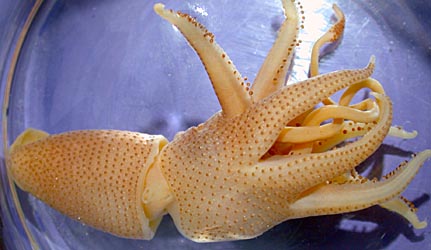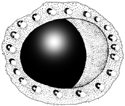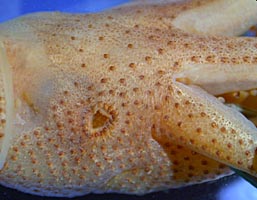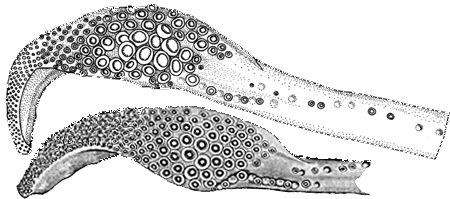Histioteuthis heteropsis: Description continued
Richard E. Young and Michael Vecchione

Click on an image to view larger version & data in a new window

Figure. Ventral view of H. heteropsis, 28 mm ML, off Southern California, preserved. Photograph by R. Young.
- Photophores
- Photophores of uniform size, small and densely packed on anterior 3/4 of ventral mantle.

Click on an image to view larger version & data in a new window


Figure. Ventral view of the mantle of H. heteropsis. Left - 70 mm ML, 33° 00'N, 121° 58'W. Drawing extracted from Fig. 29a of Voss (1969). Right - 28 mm ML, preserved, same as earlier. Photograph by R. Young.
- Photophores number usually 19-21 (17-23 range) on margin of right eyelid (drawng below).
- At least 2 series of photophores surround eye beyond the eyelid margin (photograph at left).

Click on an image to view larger version & data in a new window


Figure. Lateral view of right eyelid of H. heteropsis. Left - 70 mm ML, same specimen. Drawing modified from Voss (1969, Fig 29d). Right - 28 mm ML, preserved, same specimen.
- Arms IV with 8-10 longitudinal series on arm base.

Click on an image to view larger version & data in a new window


Figure. Ventral view of arms IV of H. heteropsis. Left - 28 mm ML, preserved, same specimen. Photograph by R. Young. Right - 70 mm ML, same specimen. Drawing extracted from Fig. 29a of Voss (1969).
- Tentacles
- Club manus with 6-8 suckers maximum in transverse series; central rows slightly enlarged.
- Carpus length about 2-2.5 times longer than club
- Carpal locking apparatus with dorsal and medial series continuous, ventral series overlaps central series. Dorso-medial series with alternating suckers and pads; ventral series with double suckers and sometimes pads proximally, alternating suckers and pads distally; ventral series overlaps medial series by 3 suckers or knobs.

Click on an image to view larger version & data in a new window


Figure.Oral views of tentacular clubs of H. heteropsis. Top - 70 mm ML, same specimen; drawing from Voss (1969, Fig. 30b). Middle - 35 mm ML, off Southern California. Drawing from Young, 1972. Bottom - Photograph by Henk-Jan Hoving.
- Arms
- Subequal; length 100-135% of ML.
- Sucker dentition
- Inner rings of club suckers with about 30-34 sharp or blunt teeth around entire margin (near drawing at right of large club sucker).
- Inner rings of arm suckers with 5-15 low, rounded or square teeth (middle and far drawings at right).

Click on an image to view larger version & data in a new window

Figure. Oral views of suckers of H. heteropsis, 65 mm ML, off Southern California. Drawing from Young, 1972.
- Web and buccal crown
- Inner web connects arms I-III and is 11-23% of longest arm.
- Outer web slightly less developed than inner web.
- Buccal crown with 7 supports.

Click on an image to view larger version & data in a new window

Figure. Oral view of the buccal crown of H. heteropsis, 70 mm ML, same specimen. Drawing from Voss (1969, fig. 30e).
- Funnel organ
- Dorsal pad unsculptured.

Click on an image to view larger version & data in a new window

Figure. Ventral view of the funnel organ of H. heteropsis, 70 mm ML, same specimen. Drawing from Voss (1969, Fig. 30f).
- Fins
- Length 27-40% of ML; width 48-56% of ML.
- Spermatophore
- Length 2.4-3.4% of ML; sperm mass 11-17% of spermatophore length (SpL); cement body 56-64% of SpL; ejaculatory apparatus 26-30% of SpL and with single loop. Ejaculatory apparatus/cement-body connective complex well developed.
- Hectocotylus
- Distal third to half of both arms I hectocotylized in males of 50 mm ML and larger.

Click on an image to view larger version & data in a new window

Figure. Oral to side view of a hectocotylus of H. heteropsis, left arm I, 75 mm ML, San Diego trough. Drawing from Voss (1969, Fig. 30a)
Comments
Except for the photographs, this description is taken from Voss (1969) and Voss, et al. (1998).
References
Voss, N.A. 1969. A Monograph of the Cephalopoda of the North Atlantic. The Family Histioteuthidae. Bulletin of Marine Science, 19(4):713-867.
Voss, N.A., K. N. Nesis, P. G. Rodhouse. 1998. The cephalopod family Histioteuthidae (Oegopsida): Systematics, biology, and biogeography. In: Systematics and Biogeography of Cephalopods. (Voss, N.A., Vecchione, M., Toll, R.B. & Sweeney, M.J., eds.). Smiths. Contr. Zool., 586(2): 293-372.
About This Page
Illustrations from Voss, 1969, printed with the Permission of the Bulletin of Marine Science.

University of Hawaii, Honolulu, HI, USA

National Museum of Natural History, Washington, D. C. , USA
Page copyright © 2000 and
 Page: Tree of Life
Histioteuthis heteropsis: Description continued
Authored by
Richard E. Young and Michael Vecchione.
The TEXT of this page is licensed under the
Creative Commons Attribution-NonCommercial License - Version 3.0. Note that images and other media
featured on this page are each governed by their own license, and they may or may not be available
for reuse. Click on an image or a media link to access the media data window, which provides the
relevant licensing information. For the general terms and conditions of ToL material reuse and
redistribution, please see the Tree of Life Copyright
Policies.
Page: Tree of Life
Histioteuthis heteropsis: Description continued
Authored by
Richard E. Young and Michael Vecchione.
The TEXT of this page is licensed under the
Creative Commons Attribution-NonCommercial License - Version 3.0. Note that images and other media
featured on this page are each governed by their own license, and they may or may not be available
for reuse. Click on an image or a media link to access the media data window, which provides the
relevant licensing information. For the general terms and conditions of ToL material reuse and
redistribution, please see the Tree of Life Copyright
Policies.


















 Go to quick links
Go to quick search
Go to navigation for this section of the ToL site
Go to detailed links for the ToL site
Go to quick links
Go to quick search
Go to navigation for this section of the ToL site
Go to detailed links for the ToL site